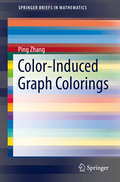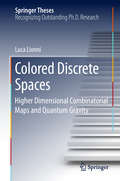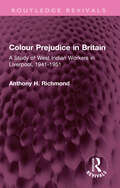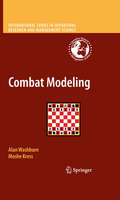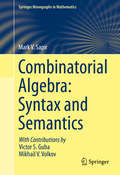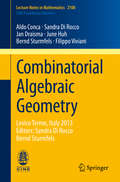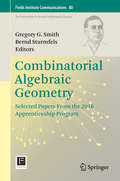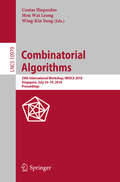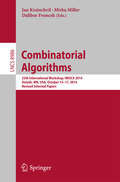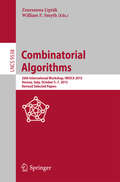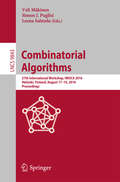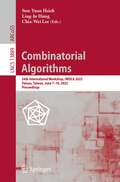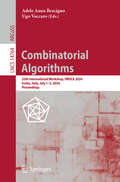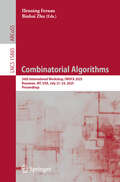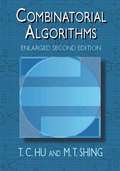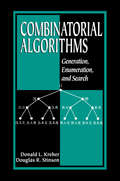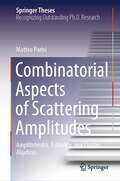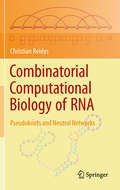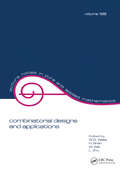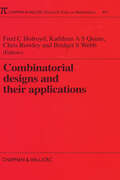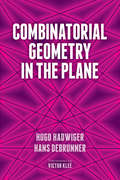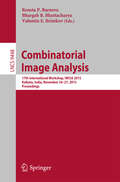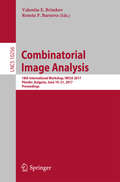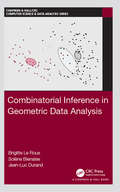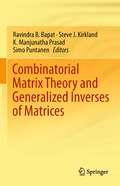- Table View
- List View
Color-Induced Graph Colorings: Vertex And Neighbor Distinguishing Edge Colorings Of Graphs (SpringerBriefs in Mathematics)
by Ping ZhangA comprehensive treatment of color-induced graph colorings is presented in this book, emphasizing vertex colorings induced by edge colorings. The coloring concepts described in this book depend not only on the property required of the initial edge coloring and the kind of objects serving as colors, but also on the property demanded of the vertex coloring produced. For each edge coloring introduced, background for the concept is provided, followed by a presentation of results and open questions dealing with this topic. While the edge colorings discussed can be either proper or unrestricted, the resulting vertex colorings are either proper colorings or rainbow colorings. This gives rise to a discussion of irregular colorings, strong colorings, modular colorings, edge-graceful colorings, twin edge colorings and binomial colorings. Since many of the concepts described in this book are relatively recent, the audience for this book is primarily mathematicians interested in learning some new areas of graph colorings as well as researchers and graduate students in the mathematics community, especially the graph theory community.
Colored Discrete Spaces: Higher Dimensional Combinatorial Maps and Quantum Gravity (Springer Theses)
by Luca LionniThis book provides a number of combinatorial tools that allow a systematic study of very general discrete spaces involved in the context of discrete quantum gravity. In any dimension D, we can discretize Euclidean gravity in the absence of matter over random discrete spaces obtained by gluing families of polytopes together in all possible ways. These spaces are then classified according to their curvature. In D=2, it results in a theory of random discrete spheres, which converge in the continuum limit towards the Brownian sphere, a random fractal space interpreted as a quantum random space-time. In this limit, the continuous Liouville theory of D=2 quantum gravity is recovered. Previous results in higher dimension regarded triangulations, converging towards a continuum random tree, or gluings of simple building blocks of small sizes, for which multi-trace matrix model results are recovered in any even dimension. In this book, the author develops a bijection with stacked two-dimensional discrete surfaces for the most general colored building blocks, and details how it can be used to classify colored discrete spaces according to their curvature. The way in which this combinatorial problem arrises in discrete quantum gravity and random tensor models is discussed in detail.
Colour Prejudice in Britain: A Study of West Indian Workers in Liverpool, 1941-1951 (Routledge Revivals)
by Anthony H. RichmondFirst published in 1954, Colour Prejudice in Britain is an account of the assimilation and adjustment of 345 West Indian workers who came to England between 1941 and 1943, many of whom have stayed to the present day. The study endeavours to trace the relationships between this group of West Indians and the English people with whom they came in contact over a period of approximately ten years. It is therefore a study in the two related fields of immigration and racial relations. This book will be of interest to students of sociology, history, and ethnic studies.
Combat Modeling (International Series in Operations Research & Management Science #134)
by Alan Washburn Moshe Kress"Combat Modeling" is a systematic learning resource and reference text for the quantitative analysis of combat. After a brief overview, authors Washburn and Kress present individual chapters on shooting without feedback; shooting with feedback; target defense; attrition models; game theory and wargames; search; unmanned aerial vehicles; and terror and insurgency. Three appendices provide a review of basic probability concepts, probability distributions, and Markov models; an introduction to optimization models; and a discussion of Monte-Carlo simulations. Drawing on their many years of experience at the Naval Postgraduate School in Monterey, California, Washburn and Kress have created a reference that will provide the tools and techniques for analysts involved in the underpinnings of combat decisions. This is a book that can be used as a military manual, reference book, and textbook for military courses on this vital subject.
Combinatorial Algebra: Syntax And Semantics (Springer Monographs in Mathematics)
by Mark V. SapirCombinatorial Algebra: Syntax and Semantics provides comprehensive account of many areas of combinatorial algebra. It contains self-contained proofs of more than 20 fundamental results, both classical and modern. This includes Golod-Shafarevich and Olshanskii's solutions of Burnside problems, Shirshov's solution of Kurosh's problem for PI rings, Belov's solution of Specht's problem for varieties of rings, Grigorchuk's solution of Milnor's problem, Bass-Guivarc'h theorem about growth of nilpotent groups, Kleiman's solution of Hanna Neumann's problem for varieties of groups, Adian's solution of von Neumann-Day's problem, Trahtman's solution of the road coloring problem of Adler, Goodwyn and Weiss. The book emphasize several ``universal" tools, such as trees, subshifts, uniformly recurrent words, diagrams and automata. With over 350 exercises at various levels of difficulty and with hints for the more difficult problems, this book can be used as a textbook, and aims to reach a wide and diversified audience. No prerequisites beyond standard courses in linear and abstract algebra are required. The broad appeal of this textbook extends to a variety of student levels: from advanced high-schoolers to undergraduates and graduate students, including those in search of a Ph. D. thesis who will benefit from the "Further reading and open problems" sections at the end of Chapters 2 -5. The book can also be used for self-study, engaging those beyond t he classroom setting: researchers, instructors, students, virtually anyone who wishes to learn and better understand this important area of mathematics.
Combinatorial Algebraic Geometry: Levico Terme, Italy 2013, Editors: Sandra Di Rocco, Bernd Sturmfels (Lecture Notes in Mathematics #2108)
by Aldo Conca Sandra Di Rocco Jan Draisma June Huh Bernd Sturmfels Filippo VivianiCombinatorics and Algebraic Geometry have enjoyed a fruitful interplay since the nineteenth century. Classical interactions include invariant theory, theta functions and enumerative geometry. The aim of this volume is to introduce recent developments in combinatorial algebraic geometry and to approach algebraic geometry with a view towards applications, such as tensor calculus and algebraic statistics. A common theme is the study of algebraic varieties endowed with a rich combinatorial structure. Relevant techniques include polyhedral geometry, free resolutions, multilinear algebra, projective duality and compactifications.
Combinatorial Algebraic Geometry: Selected Papers From the 2016 Apprenticeship Program (Fields Institute Communications #80)
by Bernd Sturmfels Gregory G. SmithCombinatorics and Algebraic Geometry have enjoyed a fruitful interplay since the nineteenth century. Classical interactions include invariant theory, theta functions and enumerative geometry. The aim of this volume is to introduce recent developments in combinatorial algebraic geometry and to approach algebraic geometry with a view towards applications, such as tensor calculus and algebraic statistics. A common theme is the study of algebraic varieties endowed with a rich combinatorial structure. Relevant techniques include polyhedral geometry, free resolutions, multilinear algebra, projective duality and compactifications.
Combinatorial Algorithms: 22th International Workshop, Iwoca 2011, Victoria, Canada, July 20-22, 2011, Revised Selected Papers (Lecture Notes in Computer Science #7056)
by Costas Iliopoulos Wing-Kin Sung Hon Wai LeongThis book constitutes the refereed post-conference proceedings of the 29th International Workshop on Combinatorial Algorithms, IWOCA 2018, held in Singapore, Singapore, in July 2018. The 31 regular papers presented in this volume were carefully reviewed and selected from 69 submissions. They cover diverse areas of combinatorical algorithms, complexity theory, graph theory and combinatorics, combinatorial optimization, cryptography and information security, algorithms on strings and graphs, graph drawing and labelling, computational algebra and geometry, computational biology, probabilistic and randomised algorithms, algorithms for big data analytics, and new paradigms of computation.
Combinatorial Algorithms: 25th International Workshop, IWOCA 2014, Duluth, MN, USA, October 15-17, 2014, Revised Selected Papers (Lecture Notes in Computer Science #8986)
by Jan Kratochvíl Mirka Miller Dalibor FroncekThis book constitutes the thoroughly refereed post-workshop proceedings of the 25th International Workshop on Combinatorial Algorithms, IWOCA 2014, held in Duluth, MN, USA, in October 2014. The 32 revised full papers presented were carefully reviewed and selected from a total of 69 submissions. The papers focus on topics such as Algorithms and Data Structures, Combinatorial Enumeration, Combinatorial Optimization, Complexity Theory (Structural and Computational), Computational Biology, Databases (Security, Compression and Information Retrieval), Decompositions and Combinatorial Designs, Discrete and Computational Geometry, as well as Graph Drawing and Graph Theory. IWOCA is a yearly forum for researchers in designing algorithms field to advance creativeness of intersection between mathematics and computer science. This is the first time this conference is being held in U. S.
Combinatorial Algorithms: 26th International Workshop, IWOCA 2015, Verona, Italy, October 5-7, 2015, Revised Selected Papers (Lecture Notes in Computer Science #9538)
by Zsuzsanna Lipták William F. SmythThis book constitutes the thoroughly refereedpost-workshop proceedings for the 26 International Workshop on combinatorialAlgorithms, IWOCA 2015, held in Verona, Italy, in October 2015. The 29 revised full papers presented were carefullyreviewed and selected from a total of 90 submissions. The topics of the papersinclude algorithms and data structures (including sequential, parallel,distributed, approximation, probabilistic, randomised, and on-line algorithms),algorithms on strings and graphs; applications (bioinformatics, music analysis,networking, and others); combinatorics on words; combinatorial enumeration;combinatorial optimization; complexity theory; computational biology;compression and information retrieval; cryptography and information security;decompositions and combinatorial designs; discrete and computational geometry;graph drawing and labeling; graph theory.
Combinatorial Algorithms: 27th International Workshop, IWOCA 2016, Helsinki, Finland, August 17-19, 2016, Proceedings (Lecture Notes in Computer Science #9843)
by Veli Mäkinen Simon J. Puglisi Leena SalmelaThis book constitutes the proceedings of the 27th International Workshop on Combinatorial Algorithms, IWOCA 2016, held in Helsinki, Finland, in August 2016. The 35 papers presented in this volume were carefully reviewed and selected from 87 submissions. They were organized in topical sessions named: computational complexity; computational geometry; networks; enumeration; online algorithms; algorithmic graph theory; dynamic programming; combinatorial algorithms; graph algorithms; combinatorics; and probabilistics.
Combinatorial Algorithms: 34th International Workshop, IWOCA 2023, Tainan, Taiwan, June 7–10, 2023, Proceedings (Lecture Notes in Computer Science #13889)
by Sun-Yuan Hsieh Ling-Ju Hung Chia-Wei LeeThis book constitutes the refereed proceedings of the 34th International Workshop on Combinatorial Algorithms, IWOCA 2023, held in Tainan, Taiwan, during June 7–10, 2023. The 33 full papers included in this book were carefully reviewed and selected from 86 submissions. They were organized in topical sections as follows: algorithms and data structures; algorithmic and combinatorical aspects of cryptography and information security; algorithmic game theory and complexity of games; approximation algorithms; complexity theory; combinatorics and graph theory; combinatorial generation, enumeration and counting; combinatorial optimization; combinatorics of words; computational biology; computational geometry; decompositions and combinatorial designs; distributed and network algorithms; experimental combinatorics; fine-grained complexity; graph algorithms and modelling with graphs; graph drawing and graph labelling; network theory and temporal graphs; quantum computing and algorithms for quantum computers; online algorithms; parameterized and exact algorithms; probabilistic and randomized algorithms; and streaming algorithms.
Combinatorial Algorithms: 35th International Workshop, IWOCA 2024, Ischia, Italy, July 1–3, 2024, Proceedings (Lecture Notes in Computer Science #14764)
by Ugo Vaccaro Adele Anna RescignoThis book constitutes the refereed proceedings of the 35th International Workshop on Combinatorial Algorithms, IWOCA 2024, held in Ischia, Italy, during July 1–3, 2024. The 40 full papers included in this book were carefully reviewed and selected from 110 submissions. The IWOCA conference series has provided an annual forum for researchers who design algorithms to address the myriad combinatorial problems underlying computer applications in science, engineering, and business.
Combinatorial Algorithms: 36th International Workshop, IWOCA 2025, Bozeman, MT, USA, July 21–24, 2025, Proceedings (Lecture Notes in Computer Science #15885)
by Henning Fernau Binhai ZhuThis book constitutes the refereed proceedings of the 36th International Workshop on Combinatorial Algorithms, IWOCA 2025, held in Bozeman, MT, USA, during July 21-24, 2025. The 32 full papers and two abstracts of invited talks included in this book were carefully reviewed and selected from 71 submissions. The IWOCA conference series has provided an annual forum for researchers who design algorithms to address the myriad combinatorial problems underlying computer applications in science, engineering, and business.
Combinatorial Algorithms: Enlarged Second Edition
by M. T. Shing T. C. HuNewly enlarged, updated second edition of a valuable text presents algorithms for shortest paths, maximum flows, dynamic programming and backtracking. Also discusses binary trees, heuristic and near optimums, matrix multiplication, and NP-complete problems. 153 black-and-white illus. 23 tables.Newly enlarged, updated second edition of a valuable, widely used text presents algorithms for shortest paths, maximum flows, dynamic programming and backtracking. Also discussed are binary trees, heuristic and near optimums, matrix multiplication, and NP-complete problems. New to this edition: Chapter 9 shows how to mix known algorithms and create new ones, while Chapter 10 presents the "Chop-Sticks" algorithm, used to obtain all minimum cuts in an undirected network without applying traditional maximum flow techniques. This algorithm has led to the new mathematical specialty of network algebra. The text assumes no background in linear programming or advanced data structure, and most of the material is suitable for undergraduates. 153 black-and-white illus. 23 tables. Exercises, with answers at the ends of chapters.
Combinatorial Algorithms: Generation, Enumeration, and Search (Discrete Mathematics And Its Applications Ser. #7)
by Donald L. Kreher Douglas R. StinsonThis textbook thoroughly outlines combinatorial algorithms for generation, enumeration, and search. Topics include backtracking and heuristic search methods applied to various combinatorial structures, such as:CombinationsPermutationsGraphsDesignsMany classical areas are covered as well as new research topics not included in most existing texts, such as:Group algorithmsGraph isomorphismHill-climbingHeuristic search algorithmsThis work serves as an exceptional textbook for a modern course in combinatorial algorithms, providing a unified and focused collection of recent topics of interest in the area. The authors, synthesizing material that can only be found scattered through many different sources, introduce the most important combinatorial algorithmic techniques - thus creating an accessible, comprehensive text that students of mathematics, electrical engineering, and computer science can understand without needing a prior course on combinatorics.
Combinatorial Aspects of Scattering Amplitudes: Amplituhedra, T-duality, and Cluster Algebras (Springer Theses)
by Matteo ParisiThis book is a significant contribution within and across High Energy Physics and Algebraic Combinatorics. It is at the forefront of the recent paradigm shift according to which physical observables emerge from geometry and combinatorics. It is the first book on the amplituhedron, which encodes the scattering amplitudes of N=4 Yang-Mills theory, a cousin of the theory of strong interactions of quarks and gluons. Amplituhedra are generalizations of polytopes inside the Grassmannian, and they build on the theory of total positivity and oriented matroids. This book unveils many new combinatorial structures of the amplituhedron and introduces a new important related object, the momentum amplituhedron. Moreover, the work pioneers the connection between amplituhedra, cluster algebras and tropical geometry. Combining extensive introductions with proofs and examples, it is a valuable resource for researchers investigating geometrical structures emerging from physics for some time to come.
Combinatorial Computational Biology of RNA: Pseudoknots and Neutral Networks
by Christian ReidysIn this monograph, new combinatorial and computational approaches in the study of RNA structures are presented which enhance both mathematics and computational biology. It begins with an introductory chapter, which motivates and sets the background of this research. In the following chapter, all the concepts are systematically developed. The reader will find * integration of more than forty research papers covering topics like, RSK-algorithm, reflection principle, singularity analysis and random graph theory * systematic presentation of the theory of pseudo-knotted RNA structures including their generating function, uniform generation as well as central and discrete limit theorems * computational biology of pseudo-knotted RNA structures, including dynamic programming paradigms and a new folding algorithm * analysis of neutral networks of pseudo knotted RNA structures and their random graph theory, including neutral paths, giant components and connectivity All algorithms presented are freely available through springer.com and implemented in C. A proofs section at the end contains the necessary technicalities. This book will serve graduate students and researchers in the fields of discrete mathematics, mathematical and computational biology. It is suitable as a textbook for a graduate course in mathematical and computational biology.
Combinatorial Designs and Applications (Lecture Notes In Pure And Applied Mathematics Ser.)
by W.D. WallisAn advanced reference containing 21 selected or consolidated papers presented at an international conference in April 1988 at Tunxi (now Hunangshan), China. Contains recent, previously unavailable findings of Chinese mathematicians; discusses problems, results, and proving methods of combinatorial d
Combinatorial Designs and their Applications
by Chris Rowley Kathleen Quinn Bridget Webb F.C. HolroydThe fruit of a conference that gathered seven very active researchers in the field, Combinatorial Design and their Applications presents a wide but representative range of topics on the non-geometrical aspects of design theory. By concentrating on a few important areas, the authors succeed in providing greater detail in these areas in a more complete and accessible form. Through their contributions to this collection, they help fill a gap in the available combinatorics literature.The papers included in this volume cover recent developments in areas of current interest, such as difference sets, cryptography, and optimal linear codes. Researchers in combinatorics and other areas of pure mathematics, along with researchers in statistics and computer design will find in-depth, up-to-date discussions of design theory and the application of the theory to statistical design, codes, and cryptography.
Combinatorial Geometry in the Plane (Dover Books on Mathematics)
by Hans Debrunner Hugo Hadwiger Victor KleeGeared toward advanced undergraduates familiar with analysis and college geometry, this concise book discusses theorems on topics restricted to the plane such as convexity, coverings, and graphs. In addition to helping students cultivate rigorous thought, the text encourages the development of mathematical intuition and clarifies the nature of mathematical research.The two-part treatment begins with specific topics including integral distances, covering problems, point set geometry and convexity, simple paradoxes involving point sets, and pure combinatorics, among other subjects. The second part consists of an extensive section of short proofs concerning the earlier material.
Combinatorial Image Analysis: 17th International Workshop, IWCIA 2015, Kolkata, India, November 24-27, 2015. Proceedings (Lecture Notes in Computer Science #9448)
by Reneta P. Barneva Bhargab B. Bhattacharya Valentin E. BrimkovThis volume constitutes the refereed proceedings of the17th International Workshop on Combinatorial Image Analysis, IWCIA 2015, heldin Kolkata, India, in November 2015. The 24 revised full papers and 2 invited papers presentedwere carefully reviewed and selected from numerous submissions. The workshopprovides theoretical foundations and methods for solving problems from variousareas of human practice. In contrast to traditional approaches to imageanalysis which implement continuous models, float arithmetic and rounding,combinatorial image analysis features discrete modelsusing integer arithmetic. The developed algorithms are based on studying combinatorial properties ofclasses of digital images, and often appear to be more efficient and accuratethan those based on continuous models.
Combinatorial Image Analysis: 18th International Workshop, IWCIA 2017, Plovdiv, Bulgaria, June 19-21, 2017, Proceedings (Lecture Notes in Computer Science #10256)
by Reneta P. Barneva Valentin E. BrimkovIt is indeed a great pleasure to welcome you to the proceedings of the 12th International Workshop on Combinatorial Image Analysis (IWCIA 2008) held in Bu?alo, NY, April 7-9, 2008. Image analysis is a scienti?c discipline providing theoretical foundations and methods for solving problems that appear in various areas of human practice, as diverseas medicine, robotics, defense, andsecurity. As a rule, the processeddata are discrete; thus, the "discrete," or "combinatorial"approachto image analysis appears to be a natural one and therefore its importance is increasing. In fact, combinatorial image analysis often provides various advantages (in terms of - ciency and accuracy) over the more traditional approaches based on continuous models requiring numeric computation. The IWCIA workshop series provides a forum for researchers throughout the world to present cutting-edge results in combinatorial image analysis, to discuss recent advances in this research ?eld, and to promote interaction with researchersfromothercountries. Infact, IWCIA2008retainedandevenenriched the international spirit of these workshops, that had successful prior meetings in Paris (France) 1991, Ube (Japan) 1992, Washington DC (USA) 1994, Lyon (France) 1995, Hiroshima (Japan) 1997, Madras (India) 1999, Caen (France) 2000, Philadelphia (USA) 2001, Palermo (Italy) 2003, Auckland (New Zealand) 2004, and Berlin (Germany) 2006. The IWCIA 2008 Program Committee was highly international as its members are renowned experts coming from 23 di?- entcountries, andsubmissionscamefrom24countriesfromAfrica, Asia, Europe, North and South America.
Combinatorial Inference in Geometric Data Analysis (Chapman & Hall/CRC Computer Science & Data Analysis)
by Solène Bienaise Jean-Luc Durand Brigitte Le RouxGeometric Data Analysis designates the approach of Multivariate Statistics that conceptualizes the set of observations as a Euclidean cloud of points. Combinatorial Inference in Geometric Data Analysis gives an overview of multidimensional statistical inference methods applicable to clouds of points that make no assumption on the process of generating data or distributions, and that are not based on random modelling but on permutation procedures recasting in a combinatorial framework. <P><P> It focuses particularly on the comparison of a group of observations to a reference population (combinatorial test) or to a reference value of a location parameter (geometric test), and on problems of homogeneity, that is the comparison of several groups for two basic designs. These methods involve the use of combinatorial procedures to build a reference set in which we place the data. The chosen test statistics lead to original extensions, such as the geometric interpretation of the observed level, and the construction of a compatibility region. <P><P> Features: <li>Defines precisely the object under study in the context of multidimensional procedures, that is clouds of points <li>Presents combinatorial tests and related computations with R and Coheris SPAD software <li>Includes four original case studies to illustrate application of the tests <li>Includes necessary mathematical background to ensure it is self–contained <P><P>This book is suitable for researchers and students of multivariate statistics, as well as applied researchers of various scientific disciplines. It could be used for a specialized course taught at either master or PhD level.
Combinatorial Matrix Theory and Generalized Inverses of Matrices
by Ravindra B. Bapat Simo Puntanen K. Manjunatha Prasad Steve J. KirklandThis book consists of eighteen articles in the area of `Combinatorial Matrix Theory' and `Generalized Inverses of Matrices'. Original research and expository articles presented in this publication are written by leading Mathematicians and Statisticians working in these areas. The articles contained herein are on the following general topics: `matrices in graph theory', `generalized inverses of matrices', `matrix methods in statistics' and `magic squares'. In the area of matrices and graphs, speci_c topics addressed in this volume include energy of graphs, q-analog, immanants of matrices and graph realization of product of adjacency matrices. Topics in the book from `Matrix Methods in Statistics' are, for example, the analysis of BLUE via eigenvalues of covariance matrix, copulas, error orthogonal model, and orthogonal projectors in the linear regression models. Moore-Penrose inverse of perturbed operators, reverse order law in the case of inde_nite inner product space, approximation numbers, condition numbers, idempotent matrices, semiring of nonnegative matrices, regular matrices over incline and partial order of matrices are the topics addressed under the area of theory of generalized inverses. In addition to the above traditional topics and a report on CMTGIM 2012 as an appendix, we have an article on old magic squares from India.
